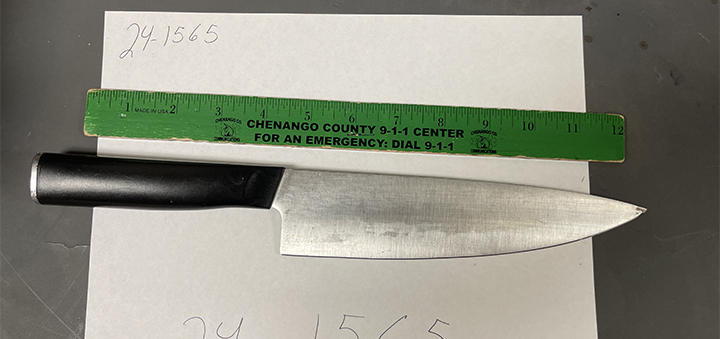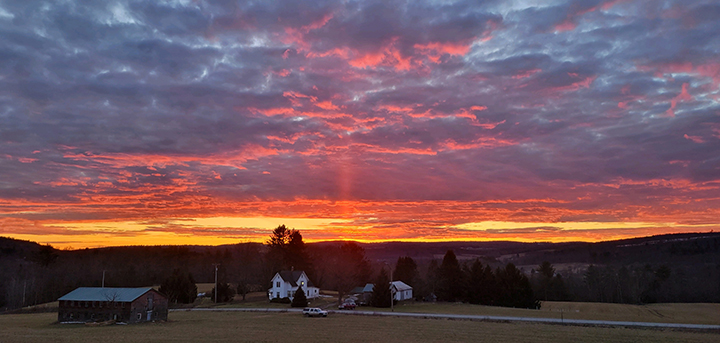NY Needs Smarter Ag Regulation: 'No Farms, No Food'
Published:
March 3rd, 2023
By:
Kelli Miller
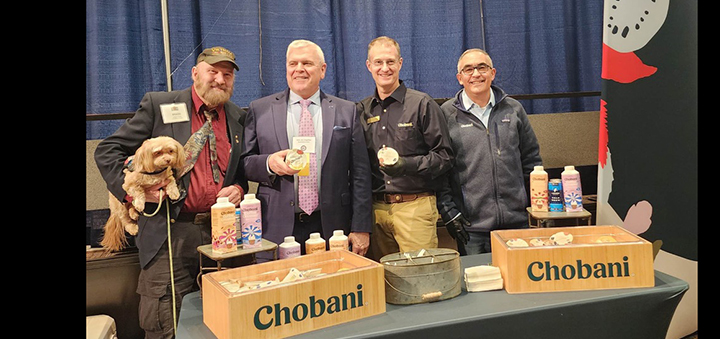 CCFB President Bradd Vickers, Assemblyman Joe Angelino, Chobani Manager Donald Brown and Senior dairy procurement Manager Tony Nassar at the 'Taste of NY' Chobani table in Albany. (Submitted photos)
CCFB President Bradd Vickers, Assemblyman Joe Angelino, Chobani Manager Donald Brown and Senior dairy procurement Manager Tony Nassar at the 'Taste of NY' Chobani table in Albany. (Submitted photos)
NORWICH – On February 27 and 28, Chenango County Farm Bureau members went to Albany to meet with legislators to present concerns regarding farming regulations.
The CCFB members included President Bradd Vickers, Promotion and Educator Rainy Collins Vickers of Vickers Farms, Vice President Joseph Cornell and CCFB member Janice Cornell of Cornell Farms, Director Jordan Fleming, and Director Jeffrey Austin Jr.
“The first day, we did a 'Taste of NY' which included more than 70 county farm bureaus, farm businesses and agricultural organizations from around New York. Chobani was one of the tables set up to share some of the best New York produced food. We invited the legislature and their staff. The object was to make sure that they are aware of the agricultural products and that a lot of agriculture is produced right here in New York State,” Vickers said.
“Keep in mind, we have a lot of downstate legislators. Our appointments the next day allowed each one of our counties to meet with assigned legislators. The purpose for that was to make them realize the AG issues because they’re voting on them. So, we want their support on issues that farm bureau supports and opposition on detrimental legislation that’s going to effect agriculture. So, we’re looking at both sides of the coin and of course the education of a legislator is very important.”
The downside of that is, even if all of our upstate legislators vote in our favor, if we’re opposed by the downstate legislators, we lose. We just don’t have the numbers to beat downstate legislators. You look at representatives from upstate NY, they’re small in numbers. So, that’s one of the main reasons we’re in Albany, to make them aware of the products and the issues.
A few regulation issues that were brought to the legislators attention by CCFB Vice President Joseph Cornell, were regarding the rather vague and/or lack of clear direction. There wasn’t a specific agency document regarding expectations on the following:
1. Interpretations of regulations regarding picking fresh fruit by workers dated 2021. There was one finding during the inspection, in 2022 there were 36. Everything was the same except a different inspector.
2. Not allowing employee to work for a company with different name, the second company owned by same people as the first company within a mile from first job site, same pay rate, same type of work, the same day.
3. Regulations composed by NYS Ag & Markets are purposely vague, in many venues. Which allows for interpretation by inspector and farm owner.
4. Cider maker has the latest technology (UV unit) for making cider which removes opportunity for sickness, blessed by the Cornell University. Water system at Cider mill passed national lab tests. Each time an inspector comes to the cider pressing operation they find something else.
“We have the best quality water and the highest quality in food productions here in New York State. One of the best markets is New York City. We have a lot of food coming in from California and other areas, into the market. So the more regulations and restrictions they put on our producers here, it makes it so they're less competitive,” Vickers said.
“One of the main issues right now is the mandated reduction of working hours for migrant farm workers, for any workers but mainly migrant workers. We're going to be short labor in New York,” he added.
The area’s representatives in the U.S House of Representatives were displeased with the New York State Department of Labor’s decision to reduce farm workers overtime pay from 60 hours to 40 hours.
Representative Marc Molinaro (NY-19), a member of the House Agriculture Committee, released this statement:
“This is a sad day for agriculture in New York State. Local farmers are already feeling the squeeze with record-high fertilizer prices, skyrocketing fuel costs, and sever workforce shortages. For some farmers, Albany’s new rule will make things even tighter. For others- this is a death blow.”
Vickers said, “Farm help will go to a different state where these regulations aren’t in place.”
Representative Elise Stefanik (NY-21), said in a prepared statement: “Albany Democrats have ignored the concerns of farmers across New York State by adopting regulations to lower the overtime threshold, which jeopardizes the future of New York’s agriculture industry and will put thousands of farm laborers out of work.
“This out of touch decision makes New York less competitive and will exacerbate the existing labor shortage our farmers are already facing. Upstate New York and the North Country are home to thousands of dairy farmers, apple growers, and maple producers, who tirelessly provide for our communities, but are now forced to bear the burden of another wrong decision made in Albany. While Albany Democrats prove their priorities are not for upstate, I will always support our farmers, because I understand: 'No farms, no food.'”
The NY Department of Labor announced their approval of the changes. A phase-in, gradual reduction in overtime pay threshold, beginning Jan 1, 2024, with the threshold set at 56 hours and continuing with overtime threshold limit reducing by four hours every other year until it reaches 40 hours in 2032.
DOL Commissioner Roberta Reardon ensures that implementing a gradual transition, farmers are given time to make adjustments.
“These new regulations advance New York State’s continued commitment to workers while protecting our farms,” she said.
“The point is, New York State has over -restrictive regulations. Other states do not have as heavy of restrictions. Producers and general people are leaving New York. We're losing farmers and losing residents of New York. Which makes you wonder, who's going to pay the taxes. We're stuck with an over-burdensome budget which is out of proportion and along with the federal budget, we're in a terrible mess,” Vickers said.
Author: Kelli Miller - More From This Author
Comments

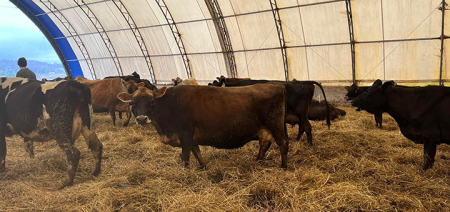


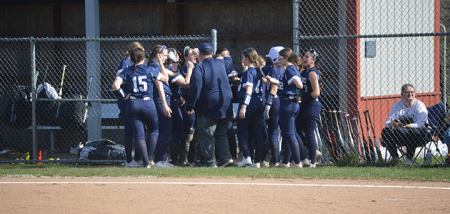
(1).jpg)
